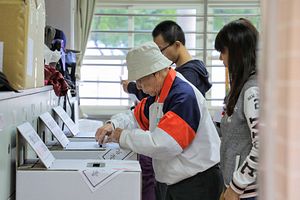Two years ago, Taiwan’s pro-independence Democratic Progressive Party (DPP) won a landslide victory in both the presidential and the legislative elections over the Nationalist Party or Kuomintang (KMT). At that time, Taiwanese voters expressed their disapproval of the KMT’s pro-China approach. In November 24 local elections, the pendulum swung back in the KMT’s favor, delivering a severe blow to Taiwanese President Tsai Ing-wen.
The extreme and unexpected shift has significant implications beyond Taiwan’s domestic politics less than 14 months before the presidential election. With the outcome of this local election leaning to China’s favor, Beijing will very likely ramp up efforts to pressure the DPP by cooperating more closely with the 15 cities and counties now under KMT rule in order to help the opposition candidate win the 2020 presidential election.
Two factors deserve to be watched more closely when looking at the volatile power dynamics inside Taiwan and across the Strait in the future: the increasing number of independent voters in Taiwan and the changing tactics of Chinese interference in Taiwanese politics.
First, the drastic swing in this election reflects the changing support of Taiwanese voters who consider themselves free of party influence, estimated to reach nearly 50 percent according to Taiwanese polls. Their skepticism toward party politics may prompt them to vote against the party that they are unhappier with given that they are not pleased with either. This is evident from the outcome of both the elections and referendums: on top of a return of the conservative voters who are the main targets of Tsai’s reforms, the DPP also lost support in its traditional base – liberal, young, and grassroots labor voters – mainly due to the Tsai administration’s ambivalent attitude toward same-sex marriage and Taiwanese independence issues, as well as its failure to conclude better economic deals for labor, farmer, and fishery groups at times of deteriorating cross-strait economic relations.
The extreme swing back against the DPP thus says little about the voters’ expectations for the KMT, or their change in identifying as Taiwanese/Chinese. An election is a show, as experienced election campaigners know. A successful campaign depends on emotional mobilization and charismatic candidates. The DPP used to be very successful in appealing to voters, but this time the KMT candidates obviously had more stories to tell.
Han Kuo-yu, the KMT mayoral candidate who surprisingly won the DPP’s stronghold of Kaohsiung, rallied against the DPP establishment, which is perceived increasingly elitist. With grassroots slogans and campaign gimmicks that impressed voters — from singing military songs to canvassing accompanied by motorcyclists — Han developed a new brand of populism similar to the one that carried U.S. President Donald Trump to election victory. Nonetheless his catchy slogans addressing local concerns, such as a pledge to “earn good money” (fa da cai), play straight into the hands of China’s united front strategies, which aim to win over Taiwanese people via economic profits.
In recent years, China’s interference with Taiwanese politics has changed from military intimidation during Taiwanese elections to information and economic warfare. The 2018 U.S.-China Economic and Security Review Commission report revealed that “China is… intensifying its political warfare activities in Taiwan. Beijing has employed a variety of tactics seeking to undermine Taiwan’s democracy, and the Tsai administration, in particular including supporting opposition political parties and spreading disinformation using social media and other online tools.” Manipulating public opinion via netizens and the media may not work for loyal party supporters, but its impact on swing voters is unpredictable.
There were also open tactics to affect the turnout of likely KMT voters. Taiwanese businessmen in mainland China, for example, were encouraged to return home to vote with discounted flight tickets. It is estimated that 100,000 of them came back to vote for this election, according to Taiwan’s Mainland Affairs Council. The number is similar to Taiwan’s 2016 presidential election, though doubled the estimated number in the same 2014 local elections.
The mid-term local elections in Taiwan are generally considered an important indicator for predicting the next presidential election. In 2005, the then-opposition KMT won the majority of the county and city seats, resulting in the KMT’s victory in the 2008 presidential election. A DPP local election victory in 2014 was also followed by the party’s presidential election victory in 2016. Both the DPP and the KMT, however, should be ready for a political outlook that is becoming increasingly unpredictable in the future. The alternations of power in liberal democracies illustrate their openness and resilience, but on the other hand such openness also brings attention to their vulnerability. Voter behavior is becoming ever more volatile and unpredictable.
At the presidential election two years ago, China’s attempt to win over Taiwanese people with economic benefits was proven ineffective. This time, the local elections outcome showed that economic issues currently are of great concern to most voters. It has to be expected that the Chinese Communist Party will ramp up efforts to work together with the newly-elected KMT county and city leaders, for example by promising economic deals to those regions willing to cooperate more closely with China. The swing voters in Taiwan seek to make their own decisions beyond party ideologies, but China is beginning to leverage its power.
Michelle Tsai is a visiting academic fellow at the Mercator Institute for China Studies (MERICS).

































